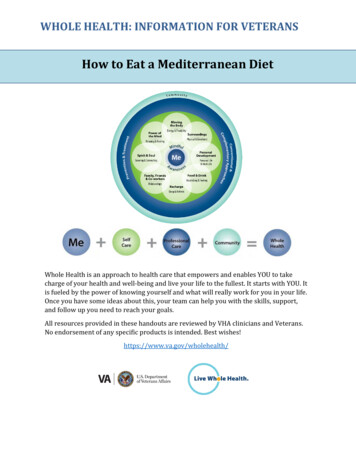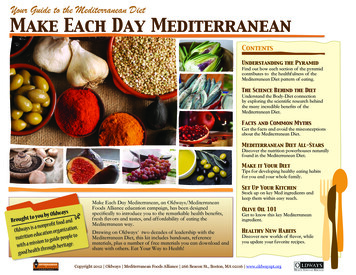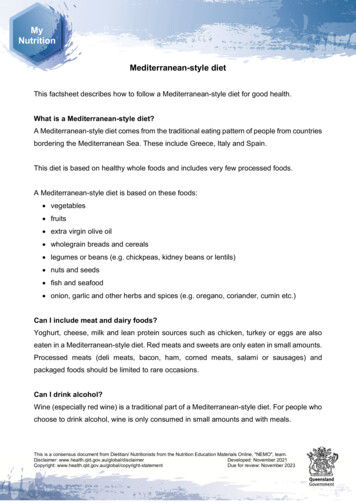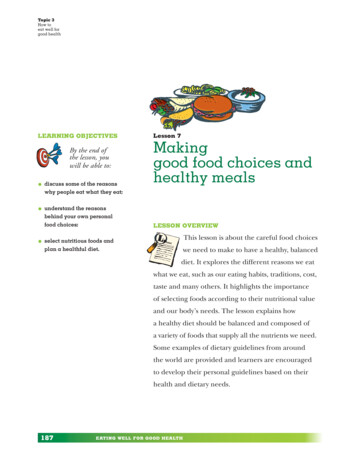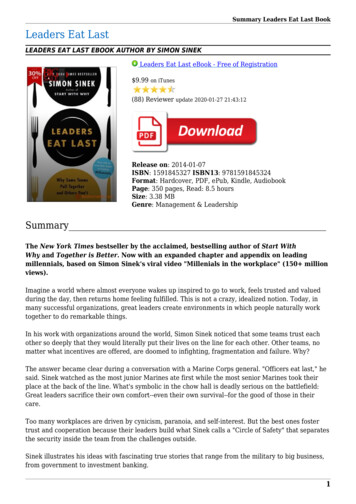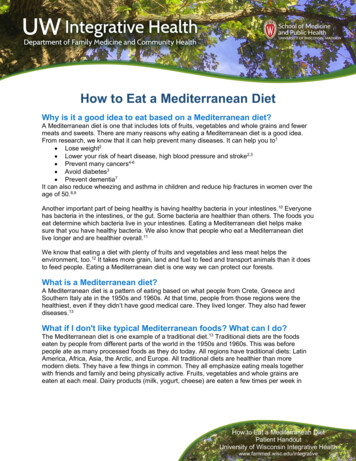
Transcription
How to Eat a Mediterranean DietWhy is it a good idea to eat based on a Mediterranean diet?A Mediterranean diet is one that includes lots of fruits, vegetables and whole grains and fewermeats and sweets. There are many reasons why eating a Mediterranean diet is a good idea.From research, we know that it can help prevent many diseases. It can help you to1 Lose weight2 Lower your risk of heart disease, high blood pressure and stroke2,3 Prevent many cancers4-6 Avoid diabetes3 Prevent dementia7It can also reduce wheezing and asthma in children and reduce hip fractures in women over theage of 50.8,9Another important part of being healthy is having healthy bacteria in your intestines.10 Everyonehas bacteria in the intestines, or the gut. Some bacteria are healthier than others. The foods youeat determine which bacteria live in your intestines. Eating a Mediterranean diet helps makesure that you have healthy bacteria. We also know that people who eat a Mediterranean dietlive longer and are healthier overall.11We know that eating a diet with plenty of fruits and vegetables and less meat helps theenvironment, too.12 It takes more grain, land and fuel to feed and transport animals than it doesto feed people. Eating a Mediterranean diet is one way we can protect our forests.What is a Mediterranean diet?A Mediterranean diet is a pattern of eating based on what people from Crete, Greece andSouthern Italy ate in the 1950s and 1960s. At that time, people from those regions were thehealthiest, even if they didn’t have good medical care. They lived longer. They also had fewerdiseases.13What if I don't like typical Mediterranean foods? What can I do?The Mediterranean diet is one example of a traditional diet.13 Traditional diets are the foodseaten by people from different parts of the world in the 1950s and 1960s. This was beforepeople ate as many processed foods as they do today. All regions have traditional diets: LatinAmerica, Africa, Asia, the Arctic, and Europe. All traditional diets are healthier than moremodern diets. They have a few things in common. They all emphasize eating meals togetherwith friends and family and being physically active. Fruits, vegetables and whole grains areeaten at each meal. Dairy products (milk, yogurt, cheese) are eaten a few times per week inHow to Eat a Mediterranean DietPatient HandoutUniversity of Wisconsin Integrative Healthwww.fammed.wisc.edu/integrative
some cultures. Meat is eaten less often. Sweets are eaten only on occasion. Fruits are eaten fordessert. An Asian traditional diet may include rice, noodles and soybeans. A Latin American dietmay have beans and corn. These diets may include different vegetables and different spices.But research shows that traditional diets are healthier than modern ones that have processedfoods and sugar.14 Processed foods are those that come in bags, boxes or cans. They mayhave artificial ingredients to make them last longer. See the following website for information onother traditional diets: http://www.oldwayspt.org/traditional-diets. One reason that traditionaldiets are healthier is that they are anti-inflammatory diets.What is an anti-inflammatory diet?Inflammation is a natural way the body protects itself. It is how the body fights off infections andsends blood to areas that need healing. It is what causes an infected area to be red, warm,swollen, and painful.However, too much inflammation can cause disease—arthritis, heart disease, rheumatoidarthritis, asthma, inflammatory bowel disease (Crohn’s disease, ulcerative colitis), chronic painand fibromyalgia, dementia, and cancer.15What we eat can cause inflammation in our bodies. We know some foods that can causeinflammation: red meat, dairy, refined and simple carbohydrates (white flour, sugar, white rice,white pasta), processed foods and alcohol. (Processed foods are those that have a long shelflife such as crackers, cookies and foods that are in boxes, bags or cans).Other foods lower inflammation in our bodies. These include fruits, vegetables, nuts, seeds,beans, whole grains, and fish. All traditional diets have foods that lower inflammation. TheMediterranean diet is one example of a traditional diet. It has been studied by manyresearchers.How do I eat a Mediterranean diet?Please refer to the pyramid diagram on the next page. Begin at the base of the pyramid. Every day:o Be physically active, eat meals with friends and familyo Eat fruits, vegetables, whole grains, beans, nuts, seeds, herbs and spicesAt least twice per week:o Eat fish or seafoodA few times per week, eat in small amounts:o Low fat dairy (cheese, yogurt)o Eggso PoultryEat less often (once per week or less)o Red meato SweetsDrink:o Mostly waterHow to Eat a Mediterranean DietPatient HandoutUniversity of Wisconsin Integrative Healthwww.fammed.wisc.edu/integrative
oWine in moderation (For women: up to 1 glass daily, with no more than 7 glassesper week. For men: up to 1-2 glasses daily, with no more than 10 glasses perweek).Figure 1. Oldways Mediterranean Diet Pyramid.13 Reprinted with permission from Oldways Preservation & ExchangeTrust. rranean-diet3 of 5How to Eat a Mediterranean DietPatient HandoutUniversity of Wisconsin Integrative Healthwww.fammed.wisc.edu/integrative
For you to consider:Do you want to try eating based on a Mediterranean diet?Is there a different traditional diet you would like to try? For example, African, Asian,Latin American, vegetarian, or vegan?Why is eating in one of these ways important to you?You are more likely to be successful if you set clear goals.o What changes will you make first as you start to eat this way?o When will you start eating this way?o What changes will you make next? When will you make these changes? The information in this handout is general. Please work with your health care team to usethe information in the best way possible to promote your health and happiness.For more information:ORGANIZATIONRESOURCESWEBSITEUniversity ofWisconsin IntegrativeHealth ProgramA variety of IntegrativeWhole Health handoutson your e/resources/modules/VA "Patient-CenteredCare” websiteVideo: “A PatientCentered Approach toFood & Drink,” 8th videoin the “Components ofHealth and Well-Being”video rces/multimedia/index.aspOldways is a nonprofit food andnutrition educationorganization, with amission to inspirehealthy eating throughcultural food traditionsand lifestyles.Information on traditionaldiets, recipes, healthstudies, and iterranean-dietConsider taking a class on nutrition in your community.This handout was adapted for the University of Wisconsin Integrative Health Program from theoriginal written for the Veterans Health Administration (VHA) by Suhani Bora MD, IntegrativeHealth Family Physician and former Academic Integrative Health Fellow, Integrative HealthProgram, University of Wisconsin Department of Family Medicine and Community Health. Thehandout was reviewed and edited by Veterans and VHA subject matter experts.4 of 5How to Eat a Mediterranean DietPatient HandoutUniversity of Wisconsin Integrative Healthwww.fammed.wisc.edu/integrative
References1. Mediterranean diet brochure. Accessed June 16, iles/MedDietBrochure.pdf2. Garcia-Fernandez E, Rico-Cabanas L, Rosgaard N, Estruch R, Bach-Faig A. Mediterranean diet andcardiodiabesity: a review. Nutrients. Sep 2014;6(9):3474-500. doi:10.3390/nu60934743. Estruch R, Ros E, Salas-Salvado J, et al. Primary prevention of cardiovascular disease with aMediterranean diet. N Engl J Med. Apr 4 2013;368(14):1279-90. doi:10.1056/NEJMoa12003034. Filomeno M, Bosetti C, Bidoli E, et al. Mediterranean diet and risk of endometrial cancer: a pooledanalysis of three Italian case-control studies. British Journal of Cancer. May 26 2015;112(11):181621. doi:10.1038/bjc.2015.1535. Schwingshackl L, Hoffmann G. Adherence to Mediterranean diet and risk of cancer: a systematicreview and meta-analysis of observational studies. international journal of cancer. Oct 152014;135(8):1884-97. doi:10.1002/ijc.288246. Toledo E, Salas-Salvado J, Donat-Vargas C, et al. Mediterranean diet and invasive breast cancer riskamong women at high cardiovascular risk in the PREDIMED trial: a randomized clinical trial. JamaNov 2015;175(11):1752-60. doi:10.1001/jamainternmed.2015.48387. van de Rest O, Berendsen AA, Haveman-Nies A, de Groot LC. Dietary patterns, cognitive decline,and dementia: a systematic review. Adv Nutr. Mar 2015;6(2):154-68. doi:10.3945/an.114.0076178. Haring B, Crandall CJ, Wu C, et al. Dietary patterns and fractures in postmenopausal women: resultsfrom the women's health initiative. Jama May 1 04829. Garcia-Marcos L, Castro-Rodriguez JA, Weinmayr G, Panagiotakos DB, Priftis KN, Nagel G.Influence of Mediterranean diet on asthma in children: a systematic review and meta-analysis.Pediatric Allergy and Immunology. Jun 2013;24(4):330-8. doi:10.1111/pai.1207110. Haro C, Garcia-Carpintero S, Alcala-Diaz JF, et al. The gut microbial community in metabolicsyndrome patients is modified by diet. J Nutr Biochem. Jan 2016;27:27-31.doi:10.1016/j.jnutbio.2015.08.01111. Saulle R, Semyonov L, La Torre G. Cost and cost-effectiveness of the Mediterranean diet: results of asystematic review. Nutrients. Nov 2013;5(11):4566-86. doi:10.3390/nu511456612. Erb KH, Lauk C, Kastner T, Mayer A, Theurl MC, Haberl H. Exploring the biophysical option space forfeeding the world without deforestation. Nat Commun. 2016;7:11382. doi:10.1038/ncomms1138213. Mediterranean diet. Accessed June 16, 2016, anean-diet14. Why traditional diets? Accessed June 16, 2016, itional-diets15. Kohatsu W. The Anti Inflammatory Diet. In: Rakel D, ed. Integr Med. 3rd ed. Saunders, an imprint ofElsevier, Inc; 2012:795-802.5 of 5How to Eat a Mediterranean DietPatient HandoutUniversity of Wisconsin Integrative Healthwww.fammed.wisc.edu/integrative
eat determine which bacteria live in your intestines. Eating a Mediterranean diet helps make sure that you have healthy bacteria. We also know that people who eat a Mediterranean diet live longer and are healthier overall. 11. We know that eating a diet with plenty of fruits and vegetables and less meat helps the environment, too. 12

